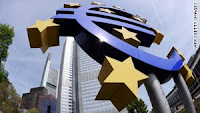
Frankfurt, Germany (FT.com) -- Germany's economy performed significantly better than expected in the first quarter of this year, helping lift prospects for the 16-country eurozone, despite the crisis over public finances.
Gross domestic product in Europe's largest economy expanded by 0.2 per cent compared with the previous three months, the country's statistical office reported. It also said Germany's economy grew by 0.2 per cent in the fourth quarter of last year -- revising up previous figures that had shown GDP remaining flat.
The data quashed fears that the bitter winter had stalled Germany's economic recovery, and set the stage for a further rebound in the current quarter. Buoyant business optimism and surging exports have all provided evidence that growth has accelerated markedly in recent months.
In turn, Germany's revival will boost hopes that the economic recovery across the eurozone will not be thrown into reverse by the crisis that erupted over Greece's public finances and spread to other southern European countries -- especially if the European Union succeeds with its €750bn emergency plan to stabilise the eurozone.
The weaker euro already appears to be benefiting eurozone exporters and the European Central Bank last week noted that "some strengthening [in growth] appears to be taking place during the spring".
However, concerns remain that the worst downturn since the second world war has left permanent scars on the eurozone economy, reducing its potential growth rate and leaving it dependent on the rest of the global economy growing at a robust pace. Economists expect the US's recovery to prove more dynamic.
Germany was one of the first industrialised countries to emerge from recession last year, and expanded by 0.4 per cent and 0.7 per cent in the second and third quarters of 2009, with the rebound helped particularly by demand for its export goods from fast-growing emerging markets. The statistical office gave no breakdown of the latest GDP growth figures but said exports and investment in machinery and equipment had made a positive contribution.
Government spending also had a positive impact. But the construction sector was hit more than normal by the poor weather. Weak consumer spending also slowed down growth in the first quarter -- and could fuel complaints from other eurozone countries that Berlin is failing to do enough to stimulate domestic demand.


ไม่มีความคิดเห็น:
แสดงความคิดเห็น